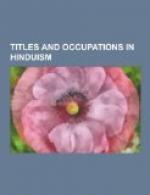|
This section contains 1,626 words (approx. 6 pages at 300 words per page) |

|
CAKRAVARTIN is a Sanskrit noun referring to an ideal universal king who rules ethically and benevolently over the entire world. Derived from the Sanskrit cakra, "wheel," and vartin, "one who turns," the term cakravartin (Pali, cakkavatti) in classical Hindu texts signifies that all-powerful monarch "whose chariot wheels turn freely" or "whose travels are unobstructed." Such a ruler's unsurpassed and virtuous rule is described as sarvabhauma; it pertains to all creatures everywhere. Buddhist and Jain literatures describe their enlightened founders (the Buddha or Buddhas and the tīrthaṅkaras, respectively) in similar terms, the notion being that religious truth transcends local or national limitations and applies to all people everywhere. This idea is particularly evident in Buddhist oral and scriptural traditions, which frequently refer to Gautama as a cakravāla cakravartin, an illuminator of dharma (life in adherence to compassionate truth) in all regions of the world. From...
|
This section contains 1,626 words (approx. 6 pages at 300 words per page) |

|


